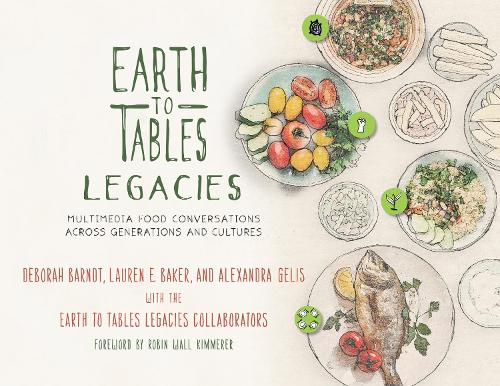
Earth to Tables Legacies: Multimedia Food Conversations across Generations and Cultures
(Paperback)
Available Formats
Publishing Details
Earth to Tables Legacies: Multimedia Food Conversations across Generations and Cultures
By (Author) Deborah Barndt
By (author) Lauren E. Baker
By (author) Alexandra Gelis
Bloomsbury Publishing PLC
Rowman & Littlefield Publishers
6th January 2023
United States
Classifications
Tertiary Education
Non Fiction
338.19
Physical Properties
Paperback
256
Width 280mm, Height 213mm, Spine 17mm
1016g
Description
Climate crises, a global pandemic, farmer protests, diet-related diseasesall of these are telling us that the industrial food system threatens our health and the health of the planet and deepens systemic inequities, racism, and poverty. Using food as an entry to key issuessuch as Indigenous-settler relations and anti-racism in the food movement Earth to Tables Legacies: Multimedia Food Conversations across Generations and Cultures tells the stories of food activists from the Americasyoung and old, rural and urban, Indigenous and settlerwho share a vision for food justice and food sovereignty, from earth to tables.
This visually stunning, full-color multimedia book generates rich conversations about food sovereignty through eleven photo essays and links to ten videos. Commentaries on each essay broaden the conversations with the experiences and perspectives of eighteen scholars and activistsboth Indigenous and settlerfrom Mexico, the United States, and Canada. Facilitators guides offer creative ways to engage students and activists in critical discussions about these issues with links to other resourcestext-based and visual, print and online.
Visit the Earth to Tables website here.
Reviews
Earth to Tables Legacies pushes back against food systems approaches that have been dominated by neoliberalism, white supremacy, patriarchy, and settler-colonialism. The authors speak to some of the most important relationships at the core of the food systems transformationIndigenous and settler; human and nonhuman; youth and elders; farmers, harvesters, and eaters, to name only a few. The book brings together different ways of knowing and shares a range of insights about the challenges, opportunities, and tensions at the heart of food sovereignty from a diverse range of scholars, activists, practitioners, and artists. The conversations, photos, stories, art, and accompanying online multimedia resources celebrate communities and social movements while providing the tools and inspiration for building sustainable food systems embedded in decolonization and social and environmental justice. Earth to Tables Legacies is needed now more than ever, to nourish our bodies, our minds, and our souls. -- Charles Z. Levkoe, Canada Research Chair in Equitable and Sustainable Food Systems, Lakehead University
Earth to Tables Legacies offers an inspired, and inspiring, compendium for recovering and co-producing food sovereignty practices. It is a well-timed and fitting testimony to the mushrooming consciousness around consolidating just and healthy agri-food relations. By seizing this world-historical moment with its multiple threads, knowledges, and intersectional dialogue, it elevates possibilities for enriching earth-centered learning and collective activism. -- Philip McMichael, Cornell University
This is a wonderful book packed with amazing stories of peoples food sovereignty struggles throughout North America. It is a must read for anyone who is looking for vision, inspiration, and hope. The multi-media approach is brilliant! -- Annette Aurlie Desmarais, Canada Research Chair in Human Rights, Social Justice, and Food Sovereignty
Starting from traditional foods, well-worn kitchen tables, rich soil, and deep personal relationships, Earth to Tables Legacies uses text, photo essays, and online videos to consider solutions to our most pressing challenges. Through intense and reflective conversations focused on food sovereignty, youth and elders, rural and urban dwellers, Indigenous/settler, BIPOC/white, Canadian and Mexican folk, the Earth to Tables Legacies collaborators urge us to look backward to find a way forward. This project is invaluable for teachers as well as anyone interested in the transformative power of food for achieving social justice and the well-being of people and the planet. -- Alison Blay-Palmer, UNESCO Chair on Food, Biodiversity and Sustainability Studies
Author Bio
Deborah Barndt is professor emerita in the faculty of Environmental and Urban Change at York University in Toronto. A social justice activist, artist, and popular educator, her photographs have been published and exhibited widely, and her books include Tangled Routes: Women, Work, and Globalization on the Tomato Trail and edited volumes VIVA! Community Arts and Popular Education in the Americas, Wild Fire: Art as Activism, and Women Working the NAFTA Food Chain (deborahbarndt.com).
Lauren E. Bakerhas more than twenty years of experience working on food systems issues with the Global Alliance for the Future of Food, the Toronto Food Policy Council, Sustain Ontario, and the Peoples Food Institute. With a PhD on maize social movements in Mexico, she has taught at the University of Toronto and Toronto Metropolitan University. Her books include Balancing the Scales: True Cost Accounting for Food and Corn Meets Maize (laurenbaker.ca).
Alexandra Gelis is a Colombian-Venezuelan-Canadian artist based in Toronto who works collaboratively with communities around the globe. Her widely exhibited installations are featured in a recent book, Alexandra Gelis: Seeds. She is completing her PhD at York University on the relationship between people, plants, and power in the context of colonization and globalization, culminating in a major multimedia exhibit: Living-With : Migrant Relations (https://www.alexandragelis.com/).
